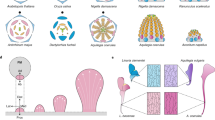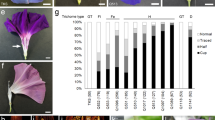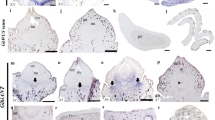Abstract
THE Loranthaceae are characterized by extremely long embryo sacs the tips of which reach up to various lengths in the style1. In four genera—Barathranthus2, Helixanthera3, Tapinostemma4, and Tupeia5—they invade the stigma ascending as far as its apex. While working on Moquiniella rubra (Spreng. f.) Balle, a species endemic to South Africa, we observed that the tip of the embryo sac not only ascends up to the apex of the stigma but also elongates further and curves downward.
This is a preview of subscription content, access via your institution
Access options
Subscribe to this journal
Receive 51 print issues and online access
$199.00 per year
only $3.90 per issue
Buy this article
- Purchase on Springer Link
- Instant access to full article PDF
Prices may be subject to local taxes which are calculated during checkout
Similar content being viewed by others
References
Johri, B. M., and Bhatnagar, S. P., Proc. Nat. Inst. Sci. India, 26 (Supp.), 199 (1960).
Prakash, Sudha, Phytomorph., 13, 97 (1963).
Maheshwari, P., and Johri, B. M., Nature, 165, 978 (1950).
Garg, Sudha, Proc. Forty-sixth Indian Sci. Congr. (Delhi), Pt. III, Abstr. 280 (1959).
Smart, Cynthia, Trans. Roy. Soc. N.Z., 79, 459 (1952).
Author information
Authors and Affiliations
Rights and permissions
About this article
Cite this article
JOHRI, B., RAJ, B. Embryo Sac Development in Moquiniella. Nature 205, 415–416 (1965). https://doi.org/10.1038/205415a0
Published:
Issue Date:
DOI: https://doi.org/10.1038/205415a0
This article is cited by
-
Morphological and embryological studies in the family loranthaceae. XII.Moquiniella rubra (Spreng. f.)Balle
�sterreichische Botanische Zeitschrift (1969)
Comments
By submitting a comment you agree to abide by our Terms and Community Guidelines. If you find something abusive or that does not comply with our terms or guidelines please flag it as inappropriate.



